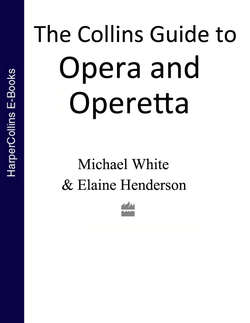Читать книгу The Collins Guide To Opera And Operetta - Michael White - Страница 23
ОглавлениеBéatrice et Bénédict
(Béatrice and Benedick)
FORM: Opera in two acts; in French
COMPOSER: Hector Berlioz (1803–69)
LIBRETTO: Hector Berlioz; after Shakespeare’s play Much Ado About Nothing
FIRST PERFORMANCE: Baden-Baden, 9 August 1862
Principal Characters
Don Pedro, a general Bass
Béatrice, Don Pedro’s niece Mezzo-soprano
Héro, Don Pedro’s daughter Soprano
Bénédict, an officer Tenor
Claudio, an officer Baritone
Somarone, an orchestral conductor Bass-baritone
Synopsis of the Plot
Setting: Messina, Italy; around 1700
ACT I The townspeople gather to celebrate Don Pedro’s defeat of the Moors. Héro is joyfully anticipating the return of her beloved, Claudio, but her cousin, Béatrice, is not so happy to contemplate the return of Bénédict, with whom she has a much more volatile relationship, one in which neither is willing to admit their true feelings for each other. The victorious forces soon arrive and Héro and Claudio happily arrange their wedding for that very evening. They encourage Bénédict to do the same, but he scoffs at the idea of marriage and declares that, if he is ever foolish enough to do such a thing, they can hang a banner on his roof announcing ‘Here is Bénédict, the married man’. This prompts Don Pedro and Claudio to hatch a plot to achieve just that. Later, Bénédict, hiding behind a hedge, hears an arranged conversation in which Béatrice confesses that she is very much in love with him – and Béatrice subsequently hears Bénédict say the same about his feelings for her. Their ideas on marriage now begin to change.
ACT II The wedding feast is well underway and, offstage, Somarone is encouraged to perform a noisy drinking song. In a quiet moment Béatrice again admits her true feelings for Bénédict and even welcomes the emotions she had for so long denied. But old habits die hard and when Bénédict appears she cannot resist baiting him in the usual way, although it is clear that a new tenderness underlies their ripostes. Claudio and Héro sign the marriage contract. The scribe has, by chance, another contract to hand and asks if anyone else wants to make use of it. Béatrice and Bénédict agree to take each other – out of pity, of course – and the banner is duly produced!
Music and Background
Berlioz’s last major work, Béatrice et Bénédict is nonetheless a short opera (one and a half hours), lightly written – ‘with the point of a needle’, as its composer said. It has brief scenes of spoken dialogue which link the musical numbers. Shakespeare’s Much Ado About Nothing is pared down to its romantic core, and wit gives way to something like a prefiguring of balmy Hollywood enchantment in the duo-nocturne at the end of Act I.
Highlights
The two trios ‘Me marier’ and ‘Je vais ďun coeur aimant’, and the brilliant closing duet.
Did You Know?
Béatrice et Bénédict isn’t the only operatic setting of Shakespeare Berlioz made. He adapted words from The Merchant of Venice to fit into the big love duet of Les Troyens.
The composer recounted that some critics praised the music of Béatrice et Bénédict ‘but found the spoken dialogue “dull”, even though it was taken almost word for word from Shakespeare’s play!’
Berlioz was sent to Paris by his parents to study medicine, but he enrolled at the Conservatory of Music instead; he played no instrument professionally and supported himself through journalism, which he hated.
Recommended Recording
Susan Graham, Jean-Luc Viala, Sylvia McNair, Opéra de Lyon/John Nelson. Erato 2292 45773-2. Clean, fresh sound with light young voices, claiming a slight edge over the old Philips recording with Janet Baker and Colin Davis.
